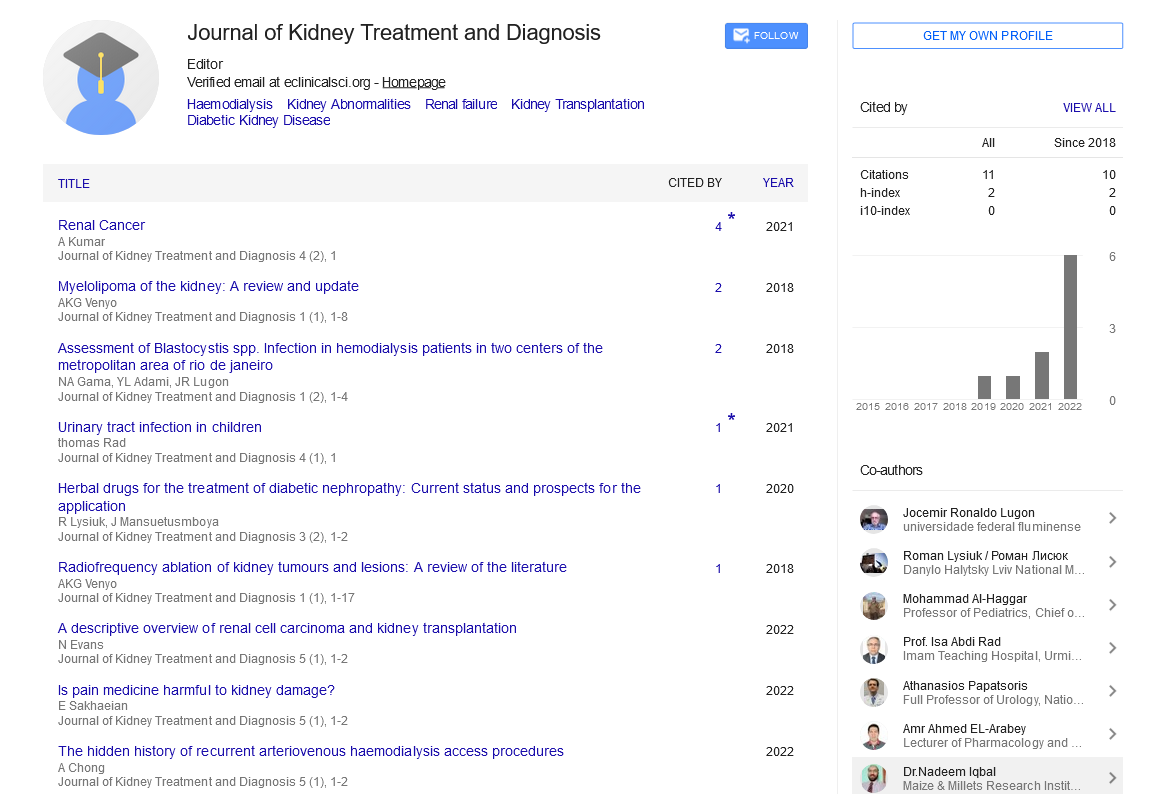
Sign up for email alert when new content gets added: Sign up
IgG4 renal disease a diagnostic dilemma and management approach
Annual Congress on Nephrology & End-Stage Renal Disease ESRD
November 16, 2022 | Webinar
Akbar Mehmood
Bradford Teaching Hospitals NHS Foundation Trust, UK
ScientificTracks Abstracts: J Kidney Treat Diagn
Abstract :
A young male was referred by GP to renal services due to unexplained rise in serum creatinine associated complaints of easy fatigability and weight loss of almost 6 kgs in 4 weeks. No other details worth to mention except frequent travelling due to his job. Detail clinical exam was unremarkable. Bed side urine dip was bland but protein creatinine ratio turned out equal to almost 1g proteinuria. Admission creatinine 292 from base line of 122 two yrs ago with eGFR drop from 62 to 21 ml/min over 2 yrs. Complements, autoimmune, vasculitis profile and myeloma screen turned out negative including bone marrow biopsy unremarkable. Raised IgG levels noticed particularly IgG4 subtype. Strong impression was IgG related disease. Kidney biopsy was performed with only nonspecific tubulointerstitial picture, not suggestive of Ig4RD. As a rescue attempt medium dose prednisone regimen administered for 2-3 months course which resulted into improvement in serum Cr to 130s base line. It was a blind treatment based to salvage nephrons with patient`s consent. Gentleman was readmitted few months later as GP detected rise in creatinine to 290s, drop in eGFR to 27ml/min from 40 over 6-8 months period. Almost two months ago he travelled to Kenya, developed symptomatic COVID infection there. In Kenya he was told eGFR has dropped. Re admitted for further evaluation. Only concerning lab finding was high Ig 4 levels. Kidney biopsy was performed again which turned out to be features consistent with Ig4 related disease, limited to kidneys. Immunohistochemistry showed significant positivity for IgG4 within the plasma cell infiltrate; approximately 150 positive cells per HPF. Dense fibrosis was present within core biopsy. However a storiform fibrosis was not established a common occurrence in needle biopsies taken for exclusion of IgG4-related disease. Steroid course resulted in creatinine improvement. Mycophenolate added to the regimen and prepared for rituximab two doses four week apart in order to cure the condition. Learning point to highlight is unexplained creatinine rise is a sensitive and specific marker heralding kidney injury necessitating cause hunt to tailor disease specific treatment. Diagnosing Ig4 related disease can be challenging. Disease course can be unusual, subtle and insidious which should not preclude redoing biopsy of the involved organ. Biochemical indicators are suggestive but tissue diagnosis is mandatory to definitely label the diagnosis as heavy immunosuppression is required to halt the process. Ig4 renal disease is a multisystem condition, missing diagnosis equals permanent failure of the organ involved. In this case ongoing kidney injury would result in renal failure requiring renal replacement therapy causing significant mental trauma along with health care economic burden. Recent publications: 1.Stone JH, Zen Y, Deshpande V. IgG4-related disease. N Engl J Med 2012; 366:539. 2 Kamisawa T, Zen Y, Pillai S, Stone JH. IgG4-related disease. Lancet 2015; 385:1460. 3 Zhang W, Stone JH. Management of IgG4-related disease. Lancet Rheumatol 2019; 1:e55. 4 Murashima M, Tomaszewski J, Glickman JD. Chronic tubulointerstitial nephritis presenting as multiple renal nodules and pancreatic insufficiency. Am J Kidney Dis 2007; 49:e7. 5 Watson SJ, Jenkins DA, Bellamy CO. Nephropathy in IgG4-related systemic disease. Am J Surg Pathol 2006; 30:1472. 6 Saeki T, Nishi S, Imai N, et al. Clinicopathological characteristics of patients with IgG4-related tubulointerstitial nephritis. Kidney Int 2010; 78:1016.
Biography :
He is working as a doctor and at Bradford Teaching Hospitals NHS Foundation Trust, UK and he has attend many international conference and also he had published many papers in the international journals.




